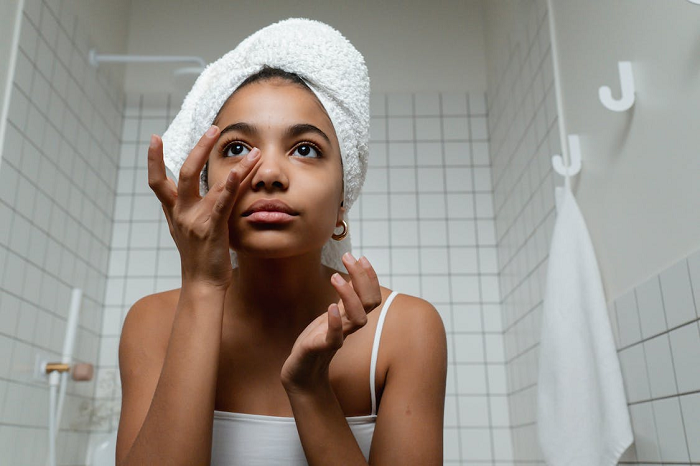Dry skin means that it cannot protect itself from the natural elements of the environment, whether they be rain or shine. Everyone’s dry skin can come in different forms. Your skin might feel tight and uncomfortable or you may develop tiny cracks in the outer layer or it might even begin to peel.
Dermatologists say that this is an interference and the skin’s ability to maintain hydration is compromised, so you need to lend an extra helping hand to retain healthy, glowy skin.
You may only get dry in specific areas of the skin; for example, I tend to get dry legs, chest and face. So to keep your body not only protected from the elements but also happy and healthy, you must ensure you are protecting it morning, noon and night.
By perfecting your nighttime routine, you are getting rid of any buildup and dirt throughout the day and giving your skin the chance to repair, rejuvenate and undo all the daytime damage. A perfect nighttime routine is essential to take care of your skin and promote a healthy, radiant complexion. salicylic acid-containing products make their symptYour skin actively produces new skin cells at night, which improves your skin texture. This will only get better if you pamper it and give it the vitamins and moisture it needs.
Dry Skin Ingredients to Avoid
To understand thoroughly why some ingredients are good for you, it’s always good to know what ingredients you run for the hills from. So products may be listed as perfect for dry skin, but in reality, they are worse for you.
Harsh Soaps
If you have ever used a cleanser or moisturiser and immediately noticed that your skin felt tight, the likelihood that it’s filled with harsh soaps is high.
According to dermatologist Marisa Garshick, these chemicals can disrupt the skin barrier and be extremely drying. She went on to say, “Soap refers to a type of surfactant that is known to be very basic and, as a result, can be harsh on the skin and strip the skin of its natural oils.”
Alcohol
No, it’s not 5 o’clock yet and it’s not quite the type of alcohol you’d like in your lime and soda. Look for words starting with “methanol,” “ethanol,” or “ethyl.” While alcohol can be a useful ingredient in skincare for getting rid of dirt and oil buildup, it can be particularly damaging for those with dry or sensitive skin.
According to Dr. Garshick, using products with alcohol can cause irritation, redness, itching and sensitivity to the skin. If this occurs after using any products, discontinue use and opt for products without these products.
Fragrance
Fragrance is the most common ingredient used in skincare. Brands want their products to smell lovely so they not only add a bit of luxury to the products but also add more incentive to use them daily.
While it can be harmless to some skin types, when it comes to dry skin irritation, allergic reactions or redness might follow shortly after use.
Dr. Garshick says, “These products often have a masking fragrance that makes them unscented, which someone can still react to,” she adds.
Salicylic Acid
Salicylic acid is a lipophilic molecule, which means that it readily combines with oil, such as sebum, or beta-hydroxy acid.
According to Dr. Camp, “It is effective as an acne medication because it helps remove oil within pores that can contribute to the formation of a pimple; however, someone with dry skin may find those salicylic acid-containing products make their symptoms of dry skin, like redness and flaking, worse.” Incorporating a “Salicylic Acid Serum” into your perfect nighttime routine can help exfoliate and unclog pores while you sleep, leading to clearer skin in the morning.
Remove them from your nighttime routine and try an oil-based cleanser, which can gently lift and remove other oil-based impurities from the skin without drying it.
Retinols

Linked to their anti-ageing properties, they are a popular product that most, if not all, people want to incorporate into their nighttime routine. Because they are known to cause peeling and dry skin, retinoids and retinol may not be as effective as they can cause more damage than good.
However, hope is not lost, says Dr. Somenek. “Because retinoids are so helpful at addressing acne-related skin concerns and photoaging-related concerns, like fine lines, wrinkles, and dark spots, I usually coach my patients to start with a small amount of retinoid when they first start using it and to use it only a few nights a week for several weeks to allow their skin to develop a tolerance to it.”
Read: Why A Marquee Is Perfect For An Outdoor Christmas Wedding
Dry Skin Ingredients to Reach For

Niacinamide
This is a perfect product or ingredient that’s perfect for dry skin. It regulates sebum production and prevents excessive oiliness or dryness, promoting a more balanced and healthier complexion.
It has also been linked to boosting the production of natural moisturising factors (NMFs) in the skin.
Hyaluronic Acid
Hyaluronic acid can store 1,000 times its weight in water, which you may be familiar with. It is precisely this molecule that makes it a popular moisturising component. Studies have indicated that hyaluronic acid-containing solutions can also reduce wrinkles, rough skin, and elasticity.
Coconut Oil
Haircare formulas and treatments for dry skin have traditionally included coconut oil. According to studies, this substance can be used as an occlusive moisturiser, which creates a barrier to shield the skin from moisture loss caused by evaporation.
While this might not be used on your face, you can most certainly use it on your body right before bed. It will give life to your skin after a long day at work.
Glycerin
Though there’s usually a legitimate reason for the acclaim of more well-known drugs, it doesn’t imply you should ignore trending components or even consider incorporating them into your routine.
For instance, the fact that glycerin is among the most commonly used moisturising components tells you something. It is highly renowned for both its effects on barrier repair and its capacity to increase skin moisture. Glycerin binds and attracts water, making it a potent humectant.
Snail Mucin
Snail mucin is a popular ingredient in Korean skin care products. It contains antioxidants that may help reduce signs of ageing like wrinkles, uneven skin tone and sagging. Studies indicate that snail mucin helps with skin regeneration and protects against damaging free radicals, which is perfect for dry skin.
Fermented Rice Water
Another popular product and ingredient used in Korean skincare is fermented rice water. If you have problems with uneven skin tone, acne, or dull skin, fermented rice water can be a big help. Increased collagen synthesis in your skin will give you a more radiant, silky complexion.
Furthermore, it facilitates the fading of imperfections, pigmented patches, and scars, which is a huge bonus and dry skin loves this product.
Morning Skincare Routine
Step One: Cleanser
After a long day, nothing feels better than having a fresh face before bed, but for the best results, the right cleanser is key. “Preparing your skin to face the day when it tends to be dry should involve using a gentle, non-foaming cleanser,” advises Dr. Lian Mack.
Look for one specially made with hydrating ingredients. You can opt for oil-based cleansers that are notorious for removing dirt, makeup and any oil buildup while not disrupting the outer skin layer. Using soft clothes to remove this product would go hand in hand.
Step Two: Vitamin C
Mack advises increasing your moisture intake even more after cleaning. “I recommend adding a vitamin C serum and layering hyaluronic acid on top for an extra surge of moisture,” according to her. “Hyaluronic acid is a well-known humectant for the skin, pulling water to it and ultimately reducing the appearance of fine lines and wrinkles.”
Step Three: Retinol
This won’t be added to your everyday routine; if you are new to this product, you will have to slowly add it to your routine as mentioned above.
Ideally, wait at least 20 minutes after cleansing and patting dry before applying your treatment to prevent irritation. By doing this, you can guarantee that the skin is totally dry before applying your active substances, which will lessen irritation and dryness.
Step Four: Serum and Hyaluronic Acid
While you don’t need to add this step, it’s good if you already have the products at hand, which are strongly recommended by dermatologists.
After applying your rationale, apply a hydrating serum, such as hyaluronic acid, to hydrate the skin. Hyaluronic acid is more effective when applied to damp skin.
It has also been recommended to mist your face after you’ve applied your retinol and before your HA serum. You can still obtain some moisturising effects by applying your HA serum to dry skin, or you can completely omit this step if it seems too hard.
Step Five: Moisturiser
Opting for extremely hydrating moisture before bed for both the body and the face will go a long way. Since your skin enters its rest and recovery phase at night, it is very crucial to use it then. “For anyone with dry skin, I recommend using a heavier moisturiser cream versus a lotion,” Hartman states.
As occlusives are the most important kind of component to search for if you have dry skin, thicker creams typically contain more of them. In addition to lasting longer on the skin, a thicker cream will not dry up as quickly as a lotion.”
Always remember to bring excess products onto the neck; you should never forget your neck when it comes to your nighttime skincare routine.
Conclusion
Overall, I believe investing in quality skincare products will not only slow down the ageing process but will also make things such as booking appointments for aesthetics in Solihull or spending hundreds of pounds on makeup few and far between. The ‘Moisturizer Boom Effect‘ can be maximized within a perfect nighttime routine by applying it to slightly damp skin after cleansing, locking in hydration for overnight repair. When it comes to perfecting your nighttime skincare routine, a lot of it will come with research and spending time finding the perfect products. If anything, Korean skincare products seem to of hydrating and anti-ageing properties and are worth the money in the long run. In these cases, a little does go a long way.

